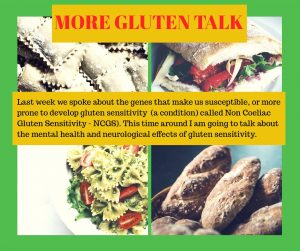Last week we spoke about the genes that make us susceptible, or more prone to develop gluten sensitivity (a condition called Non Coeliac Gluten Sensitivity – NCGS). This time around I am going to talk about the mental health and neurological effects of gluten sensitivity..
The ill effects of gluten occur when we produce antibodies that impede the healthy function some of our own enzymes. Routinely sufferers experience the ill effects in their digestive tract due to the blockade of an enzyme called TTG. But it is now known that there are at least 6 different types of this enzyme, including in your skin and your brain/nervous system.
This interference with TTG in the brain can lead to many different problems including
*neuropathy (nerve pain)
* brain fog
* myopathy (muscle pain and inflammation)
* co-ordination difficulties
• even hallucinations and schizophrenia
• ataxia (co-ordination disorder)
One large study showed that those with NCGS were more likely to suffer from the brain effects than the intestinal, digestive problems
Another enzyme called GAD, which breaks down glutamate can also be blocked by those with gluten sensitivity. This can lead to an increase in glutamate which can cause irritability, anxiety and other behavioural disturbances (akin to the reaction people can experience with MSG). This increase in glutamate is known as a common biochemical finding in anxiety.
Although less common, case reports exist of a gluten free diet reversing the development of Type 1 Diabetes in infants and toddlers.
So there can be a lot to be gained from going gluten-free in many varied heath conditions
The key is to eat whole foods such as
• quinoa
• buckwheat
• rice (preferably brown, black or red)
• millet
• amaranth
• corn * (as many as 1 in 3 people with gluten allergies , intolerances will cross react with corn)
• beans
• lentils
• chickpeas
So there are many choices to stay healthy if you decide to go gluten-free.
Gluten is contained in many processed foods and the following whole foods
• wheat, couscous, kamut, burghul, wheat germ , wheat bran and starch
• rye
• barley
• malt, malt extract & syrup
• semolina
• oats and spelt * (these tend to be less likely to cause symptoms)
So if you have a health concern that may be caused by gluten sensitivity, go gluten-free.
Or book an appointment and allow our experienced Naturopaths (Tracey Cook and Craig Wainwright) to assess your health and put you on the path to being your most vibrant self by calling 8271-1827 today
Regards
Craig
Naturopath, Pharmacist
To read the previous post ” Gluten – TO EAT OR NOT TO EAT” click the link below
GLUTEN – TO EAT OR NOT TO EAT…
08 8271 1827
info@botanicamedica.com.au


Recent Comments